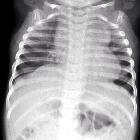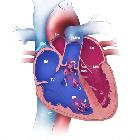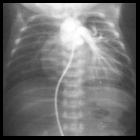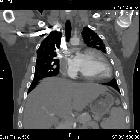congenital heart disease









Congenital cardiovascular anomalies are relatively common, with an incidence of up to 1% if small muscular VSDs are included. As a group, there is a much greater frequency in syndromic infants and in those that are stillborn.
Clinical presentation
Broadly, congenital cardiovascular anomalies can be clinically divided into:
Depending on the lesion and its severity, patients may be asymptomatic or conversely, may present with rapidly deteriorating congestive cardiac failure.
Pathology
These defects as a group have a heterogeneous etiology with many resulting from an interplay between both genetic and environmental factors.
Subtypes
A list of anomalies and their approximate occurrences (as a percentage of all congenital cardiac disease) are given below:
- ventricular septal defect (VSD): 40%
- atrial septal defect (ASD): 10%
- congenital pulmonary stenosis: 8%
- patent ductus arteriosus (PDA): 7%
- transposition of the great arteries (TGA): 7%
- tetralogy of Fallot (TOF): 5%
- coarctation of the aorta: 5%
- atrioventricular septal defect (AVSD): 4%
- congenital aortic stenosis: 4%
- hypoplastic left heart syndrome (HLHS): 4%
- double outlet right ventricle (DORV): 2%
- interrupted aortic arch (IAA): 1.5%
- truncus arteriosus: 1%
- total anomalous pulmonary venous return (TAPVR): 1%
- tricuspid atresia: 1%
- pulmonary atresia:
- Ebstein anomaly: 0.7%
- Bland-White-Garland syndrome: ~0.5%
- cor triatriatum: ~0.1%
- partial anomalous pulmonary venous return (PAPVR): 0.5%
- double outlet left ventricle (DOLV)
- aortopulmonary septal defect: <1%
- Gerbode defect: <1%
- Shone complex: <1%
- hypoplastic right heart syndrome (HRHS)
- aortoventricular tunnel <0.1%
Other valvular anomalies
Percentages may not necessarily add up to 100 due to overlap and simultaneous occurrence of abnormalities.
Associations
Congenital cardiac anomalies can be found with many aneuploid conditions which include:
- trisomy 18: up to 90% can have cardiac anomalies
- trisomy 13: up to 90%
- trisomy 21: up to 50%
- Turner syndrome: up to 40%
Siehe auch:
- Aortenisthmusstenose
- Persistierender Ductus arteriosus
- Chiari-Netz
- Pätau-Syndrom
- Down-Syndrom
- Normvarianten Koronararterien
- Atriumseptumdefekt
- Ebstein anomaly
- Cor triatriatum
- Turner-Syndrom
- Fallot'sche Tetralogie
- Trisomie 18
- Varianten der Herzanatomie
- Transposition der großen Arterien
- tricuspid atresia
- hypoplastic left heart syndrome
- Bland-White-Garland-Syndrom
- double outlet right ventricle (DORV)
- quadricuspid aortic valve
- Bikuspidalität der Aortenklappe
- Normale Herzkonfiguration im Röntgen-Thorax
- totale Lungenvenenfehlmündung
- atrioventricular septal defect (AVSD)
- partielle Lungenvenenfehlmündung
- conotruncal cardiac anomalies
- Divertikel des linken Vorhofs
- Pulmonalatresie
- congenital aortic stenosis
- Ventrikelseptumdefekt
- Single Ventricle
- fibromuskuläres Band im linken Vorhof
- Valvula Eustachii
- double chamber right ventricle (DCRV)
- kongenitale Pulmonalstenose
- Atresie der Aorta
- Truncus arteriosus communis
- congenital heart disease : CXR approach
und weiter:
- Lungensequester
- Ektasie Aorta ascendens
- einseitig vermehrte Transparenz Thorax
- acute respiratory distress syndrome (ARDS)
- obstetric curriculum
- Hydrops fetalis
- kongenitale pulmonale Atemwegsmalformation (CPAM)
- Situs inversus
- Ösophagusatresie
- Chylothorax
- Kardiomegalie
- nuchal translucency
- Situs ambiguus
- acyanotic congenital heart disease
- Diastrophische Dysplasie
- Mikrognathie
- rechts descendierende Aorta
- mandibuläre Retrognathie
- fetal pleural effusion
- fetal conditions associated with maternal diabetes
- nuchal thickness
- Ellis-van-Creveld-Syndrom
- CHARGE-Syndrom
- abnormal ductus venosus waveforms
- Fetales Valproat-Syndrom
- Abernethy malformation
- Golfballphänomen
- epikardiale Schrittmachersonden
- Embryopathia rubeolosa
- CXR approach to congenital heart disease
- caudal dysplasia sequence
- Rubinstein-Taybi-Syndrom
- Cornelia-de-Lange-Syndrom
- Surfactant-Mangelsyndrom
- camptomelic dysplasia
- Goldenhar-Gorlin-Syndrom
- chest x-ray appeoach to congenital heart disease
- endocardial cushion defect
- Kabuki-Syndrom
- Fryns-Syndrom
- congenital heart disease - chest x-ray approach
- Lungensequester extralobulär
- absent ductus venosus
- verzögerte Skelettreifung
- mesoectodermal dysplasia
- Thrombozytopenie-Radiusaplasie-Syndrom
- Polysplenie-Syndrom
- fetal tachyarrhythmia
- fetal complete atrioventricular block
- anomalous left coronary artery off the pulmonary artery
- transient tachypnea of newborn
- hydrolethalus
- dilantin embryopathy
- McKusick-Kaufman-Syndrom
- four chamber cardiac view
- Zyanotischer Herzfehler
- lentiginosis profusa syndrome
- fetal bradyarrhythmia
- iron deficiency anaemia
- congenital vascular anomalies
- Miller-Dieker Syndrom
- Zephalozele
- camptomelic dwarfism
- fetal nuchal oedema
- Herzektopie
- retained foetal fluid
- cyanotic congenital cardiac anomaly
- kongenitaler Hydrozephalus
- Nabelvenenaneurysma

 Assoziationen und Differentialdiagnosen zu congenital cardiovascular anomaly:
Assoziationen und Differentialdiagnosen zu congenital cardiovascular anomaly:


























